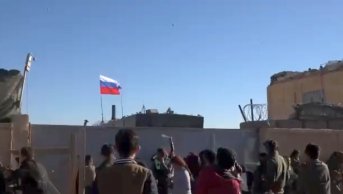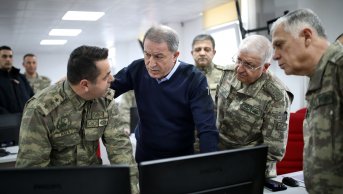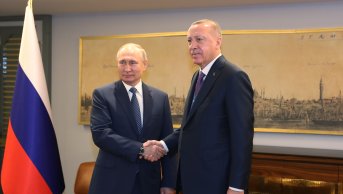How Will Türkiye End Terrorism in Iraq and Syria?

Syria and Iraq have been grappling with armed conflicts for many years. In this process, Türkiye has been the country most exposed to the political, military, and economic contagion effects of the civil wars in both countries. Since 2016, Türkiye has been aiming to create a security corridor free of terrorist organisations along the line stretching from the Mediterranean Sea to Iran in order to eliminate the contagion effects from Syria and Iraq until authority is established. Türkiye also wants this corridor to be controlled by local allied actors until legitimate governments are capable of providing security.
Türkiye's counterterrorism strategies
Türkiye's cross-border fight against the terrorist organisation PKK has military and diplomatic pillars. Militarily, cross-border military operations, airstrikes, impact-oriented, and limited-targeted operations stand out. The Syrian and Iraqi territories differ in terms of geography and population structure, and the presence of the terrorist organisation PKK in these two countries has different characteristics. Accordingly, Türkiye has determined different military tactics and strategies in both countries.
The Syrian border is a flat area, and there is a dense population along the border line. Therefore, when the conditions are suitable in Syria, Türkiye ends the organisation's territorial control through large-scale ground operations and eliminates the administrative structures created by the PKK. In their place, alternative administrative and security structures based on local forces are created. In fact, an important part of the efforts to ensure security on the Syrian border is the normalisation and reconstruction efforts after military operations. In the absence of conditions for a ground operation, impact-oriented operations targeting the organisation's leadership and sources of income are regularly carried out.
The Iraqi border is mountainous, and there is very limited settlement along the border. Türkiye is clearing the areas in northern Iraq where the PKK is based, establishing temporary military bases at critical points, and trying to prevent the organisation from infiltrating into Türkiye. The difference between these operations and those of the past is that the areas cleared by the terrorist organisation PKK are taken under control in a way that will not allow the organisation to return.
Different relations in Iraq, different relations in Syria
The diplomatic pillar of Türkiye's fight against the PKK terrorist organisation in Syria and Iraq is critical to the success, sustainability, and legitimacy of military operations. The local and external actors Türkiye needs to deal with in Syria and Iraq are different. In Iraq, Türkiye is trying to gain the support of the Baghdad and Erbil administrations. The recent visits of senior Turkish foreign policy and security officials to Iraq can be considered in this context.
As a result of the recent negotiations, important steps have been taken in cooperation with Baghdad in the fight against the terrorist organisation PKK. Baghdad does not define the PKK as a terrorist organisation. However, it is a positive development that Baghdad has recognised the PKK as an illegal organisation for the first time. Within the Arbil administration, there is a dual attitude towards cooperation with Türkiye against the terrorist organisation. The Kurdistan Democratic Party (KDP) wing of the Iraqi Kurdish Regional Government (KRG) has begun to view the PKK as a threat to its sovereignty. The Arbil administration is also relatively willing to work more closely with Türkiye. However, the Patriotic Union of Kurdistan (PUK)-controlled Sulaymaniyah wing has taken the opposite stance towards Arbil. The PUK not only refuses to cooperate against the PKK but also opens space for the organisation in areas where it is strong. Moreover, the PUK supports the organisation in Iraq and Syria. Therefore, a military move to Northern Iraq is likely to include an operation focused on the PKK presence in Sulaymaniyah. On the other hand, Türkiye has to consider the objections and counter-moves raised by the US and Iran, even if they are not directly involved.
On the diplomatic side of the fight against the PKK in Syria, there are talks with Russia, the US, Iran, and the Syrian government. Türkiye, with the contribution of Russia, its partner in the Astana Process, had initiated a dialogue process with Damascus and sought cooperation against the PKK/YPG. Although the negotiations with the Syrian government have progressed rapidly, they have not yielded any results. Nevertheless, Türkiye continues its operations against the PKK in Syria on a regular basis. These operations are primarily aimed at weakening the PKK/YPG's military infrastructure and limiting its economic sources of income. Through regular operations, Türkiye is also forcing the Syrian government to cooperate with it against the PKK. If this cooperation is not achieved, it seems inevitable that Türkiye will carry out unilateral military operations as it has in the recent past.
What awaits Türkiye in the fight against terrorism?
The Syrian government, Russia, the US, and Iran are wary of the possibility of such a move by Türkiye, and all four countries continue to search for alternative solutions that can convince Türkiye. At this point, the US is trying to purge the SDF/YPG from the PKK and put the existing structure into a framework that Türkiye can accept. However, this is not a viable solution for Türkiye. In an environment where support for the SDF/YPG continues to increase, doubts about US intentions are growing. Türkiye's second option is cooperation with Russia in Syria. At the moment, this option seems more plausible and realistic for Türkiye. This scenario requires the Ankara-Damascus dialogue process to move forward. For this to happen, Damascus needs to give up its unacceptable preconditions and retreat to a more realistic ground. There are two steps to take to achieve this. The first is Russia's diplomatic pressure on Damascus, and the second is Türkiye's demonstration that it will continue to fight the terrorist organisation PKK/YPG under all circumstances. In this respect, Türkiye's impact-oriented operations against the YPG, which continue to increase in intensity from time to time, are of great importance. In addition, Türkiye does not hesitate to target Syrian regime elements acting with the terrorist organisation YPG in these operations.
The most likely near - future scenario for Türkiye's fight against the PKK in Iraq is a new military operation. In fact, since 2017, Türkiye has carried out a series of military operations that can be characterised as a continuation of each other. However, a new military operation is likely to have a more critical geographical target and a broader scope. As a result of the recent negotiations with Baghdad, it was decided to establish a "joint operations centre". The question that comes to mind here is whether there is a possibility of the Turkish Armed Forces (TAF) conducting a joint operation with the Iraqi army, but this may be an optimistic expectation for now. Nevertheless, it is critical for the success and legitimacy of the operation that the TAF coordinate its military operations in Iraq with Baghdad and at least cooperate on intelligence. The Iraqi army may not have the capacity and will to directly fight the PKK. However, the deployment of legitimate local forces in the regions cleared of the PKK in the later stages may create a common ground to address the security concerns of both the Iraqi administration and Türkiye.
This article was published on Anadolu Agency website on April 1, 2024 with the title "Türkiye Irak ve Suriye'de terörü nasıl bitirecek?"








